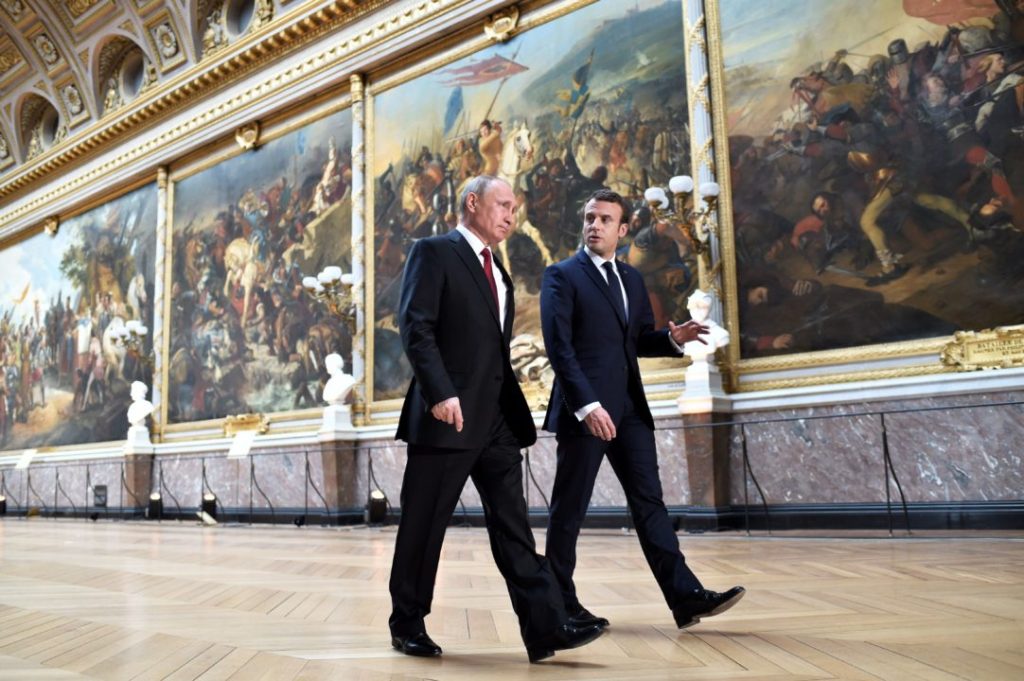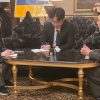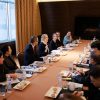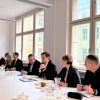Comment by Leo Litra for POLITICO Europe.
French leader gambles that reaching out to Moscow can make Europe less dependent on US.
PARIS — Never short of self-confidence, Emmanuel Macron thinks he can succeed where Angela Merkel, Barack Obama and others have failed — by turning Vladimir Putin into a security partner for Europe.
In pursuing a policy of outreach to Moscow, Macron is taking on one of the greatest geopolitical challenges facing Europe’s democracies — how to handle their big, nuclear-armed neighbor as it has become increasingly aggressive in recent years, waging war in Ukraine, annexing Crimea, trying to assassinate opponents on European soil and carrying out cyberattacks on Western targets.
Macron’s approach, which he has defended repeatedly in recent weeks, is part of an even bigger shift the French president aims to achieve — moving Europe away from a dependence on the United States to make the Continent more strategically autonomous, able to take the lead on decisions about its own security.
To many governments and Russia experts, Macron’s policy is both naïve and dangerous, carrying the twin risks of dividing the West and encouraging bad behavior from Moscow. Many fear the young first-term French president will simply be outwitted by his wily Russian counterpart, a former Soviet intelligence officer who has been in power for two decades.
“Thinking that Putin will be seduced by this dialogue is quite naïve. I think that President Macron, who is very seductive, is overestimating his strength of seduction,” said Agnieszka Holland, an Oscar-nominated Polish filmmaker who grew up under Soviet-dominated communism and attended a dinner hosted by the French president for a small group of intellectuals when he visited Warsaw last week.
“The principal objective of my approach to Russia is the improvement of the conditions of the collective security and stability of Europe” — Emmanuel Macron, French president
In typical fashion, Macron has acknowledged the criticism but doubled down on the policy. He regularly insists he is not dewy-eyed when it comes to Russia and says he is instead engaged in a clear-eyed, long-term project to advance Europe’s interests.
“The principal objective of my approach to Russia is the improvement of the conditions of the collective security and stability of Europe. This process will take many years,” he said in a speech on defense and nuclear policy last week in Paris.
Reset required?
French officials argue that the reasons for trying to forge a new relationship with Russia are self-evident. The tapestry of alliances and agreements that has assured European security is under severe strain. The United States is now seen as a more unreliable partner and less focused on Europe. Cold War-era arms control agreements, like the Intermediate-range Nuclear Forces (INF) treaty, are falling apart.
Macron contends that Europe itself should take the lead in building itself a new security architecture — and that means engaging with Russia. He has also stated, none too subtly, that Europe should not rely on Washington having the Continent’s best interests at heart.

Can Macron succeed in forging a new relationship with Moscow?
“If Europe doesn’t express its own voice toward Russia, and if we seek refuge in the caricature that we sometimes make of ourselves, meaning being the visible side of American influence in this part of the world, then we will not be able to move forward,” he said in a speech to the French community in Warsaw last week.
“Who suffers today from economic sanctions, frozen conflicts, the impossibility of stabilizing the architecture of confidence in Europe, other than Europe and Europeans? Not those who live on the other side of the world and push us to go further in this direction.”
French officials also argue that Macron’s policy — which he has pursued since the early days of his presidency nearly three years ago — is less controversial than has been portrayed, with widespread agreement across Europe that leaders need to talk to Russia.
“I know of no partner, not the Polish or the Baltic states, that contest the necessity to negotiate with the Russians about security conditions on the Continent,” said a high-level French diplomatic official involved in Russian policy. “It’s evident that it’s not a bilateral exercise.”
Someone had to make sure Europe sets the terms of discussion for new agreements on missile control and European security, the official said, and “that’s what the president is doing.”
But many of Macron’s European partners remain deeply skeptical, even suspicious, of both Putin and of Macron’s efforts.
Eastern European and Baltic leaders, who lived under Soviet repression and the threat of Russian expansionism since the end of the Cold War, do not believe that Putin is interested in more constructive relations and have complained that France and Macron do not take their security concerns to heart.
Macron’s method
In his approach to Russia, two signature elements of Macron’s foreign policy method are at the fore — a drive to ensure France is at the center of international affairs and a belief in his power to build strong personal relationships with fellow leaders.
The French president’s particularly personal — sometimes empathetic — way of dealing with Putin has made a lot of his European partners nervous.
He often mentions the trauma of Putin’s brother’s death in the siege of Leningrad to suggest that the Russian president’s background is profoundly European. French officials hope that Putin can be persuaded that Russia’s best interests lie in a partnership with Europe rather than throwing in its lot with China, where it would be very much the junior partner.
“There’s a feeling that this personal relationship is constructive and that there are advisers and ministers around the Russian president who are harder than him, and so it’s useful to try to work one on one from president to president,” said a French official close to Macron.
“It’s tactical and geopolitical,” the official said. “If you don’t want Russia to hole itself up or drift toward other alliances, then it’s important to remind them of a historical, political and cultural reality that Russia is a European country.”
“Special status helps Russia, [it] would enable the regions to block anything which Russia doesn’t like” — Leo Litra, analyst
Macron has also voiced sympathy for at least part of Putin’s worldview.
In 2016, as finance minister, he told a group of French businessmen that he favors lifting sanctions against Russia imposed by the U.S. and the EU after the annexation of Crimea in 2014. Under Macron’s presidency, France backs maintaining those sanctions, but the president himself is not believed to be a strong supporter, seeing them as ineffective and primarily imposed to align with U.S. policy.
Macron has also repeatedly said that Russia “is not an enemy” and has echoed Russian criticism of the West’s handling of NATO’s eastward expansion.
“Europe no doubt did not enact its own strategy and gave the impression of being a Trojan Horse for the West, whose final aim was to destroy Russia,” he said in a speech to French ambassadors last August.
French officials insist their approach is not all about expressing sympathy. Rather they suggest it is in keeping with Macron’s “on the one hand, on the other hand” style — coupling an offer of partnership on the one hand with tough talk and hard power on the other.

Fighter jets on the deck of a French aircraft carrier
When he hosted Putin at the Palace of Versailles in 2017, soon after he began his term as French head of state, Macron held out the prospect of working together on Syria but also firmly and publicly denounced Kremlin-directed information warfare targeting France and other Western democracies.
Officials in Paris note that French warships patrol the Baltic Sea, French troops are deployed as part of NATO’s Enhanced Forward Presence in Northern and Eastern Europe to deter Russian and aggression, and France bombed Syrian regime targets after President Bashir al-Assad, Putin’s ally, used chemical weapons.
Paris has also harked back to the Cold War to try to reassure allies that it is using a classic mix of deterrence and dialogue, as outlined in a landmark NATO document from the 1960s, the Harmel Report.
Officials point to subtle messaging — like Macron hosting Putin in the Gallery of Battles at the Versailles Palace in 2017, or France prominently positioning a frigate that took part in the bombing of Syria when the Russian leader visited Macron at the Fort of Brégançon in southern France last year.
Progress questioned
Macron’s critics say such messaging is almost certain to have no effect on Putin and some of the hard-power measures were in the works before he took office.
More pointedly, they say Macron has little to show for his efforts so far. Putin’s policies in Ukraine, his attitude toward the EU and NATO, and Russia’s role in Syria all appear to have changed little or not at all.
Macron himself has pointed to the restart of so-called Normandy Format talks over the conflict in Ukraine, bringing together the leaders of Russia, Ukraine, France and Germany in Paris last December, as a concrete sign of progress.
But that gathering was regarded quite differently by many in Ukraine, who saw Putin use it as a platform to push for special status for Russian-controlled regions in the east of the country, which would make it impossible for Kyiv to pursue aspirations for closer ties with NATO and the EU.
“Special status helps Russia, [it] would enable the regions to block anything which Russia doesn’t like,” said Leo Litra, senior research fellow at the New Europe Center think tank in Kyiv.

Vladimir Putin and Emmanuel Macron in St. Petersburg in 2018
“Macron is in a way destroying the unity of the West toward Russia. There was a consensus among the Western countries that Russia has to de-escalate, and this didn’t happen and then … Macron tries to reengage with Russia,” Litra said.
Even among those who agree with Macron on the need to reengage, there is a skepticism about his ability to close the deal. And, ironically, for a president trying to make Europe more independent from the U.S., the ultimate winner from his diplomatic efforts may be the dealmaker-in-chief in the White House.
“The Russians orient toward a Euro-Atlantic order, they just want a very different role in that order than we are willing to give them,” said Matthew Rojanksy of the Wilson Center think tank in Washington.
“I am inclined to believe that sooner or later there must be an opportunity for effective negotiators in Russia and in the West to restore functionality to the relationship. The question that matters at this moment in time is: Are those negotiators Vladimir Putin and Emmanuel Macron? I am not convinced yet, because the relative power of the U.S. in this picture is still very high,” said Rojanksy.
“The best case for Macron would be: He is putting in place a lot of the pieces and what will happen is, if Donald Trump is elected, maybe he will attempt his own reset and then Trump will get the credit.”








